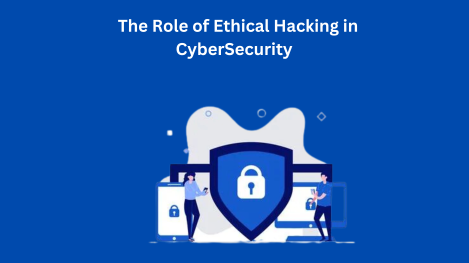 The necessity for strong cyber security measures has never been more pressing in a world where data is the new currency. The fear of cyber attacks is real as organizations and individuals maintain an ever-increasing quantity of sensitive information online.
The necessity for strong cyber security measures has never been more pressing in a world where data is the new currency. The fear of cyber attacks is real as organizations and individuals maintain an ever-increasing quantity of sensitive information online.
This is where ethical hacking, sometimes known as “white-hat” hacking, plays a crucial part in protecting digital assets. In cyber security, Ethical Hacking Training has emerged as a pillar that assists organizations in defending themselves against harmful assaults and vulnerabilities.
The vital role of Ethical Hacking and Cyber Security will be discussed in this blog, along with how Ethical hacking training and practices improve the overall security environment.
Table of contents
• Understanding Ethical Hacking and Cyber Security
• Identifying Vulnerabilities
• Security Improvement
• Real-World Testing
• Compliance and Regulations
• Incident Response Preparation
• Staying Ahead of Evolving Threats
• Building a Security-Centric Culture
• Conclusion
Understanding Ethical Hacking and Cyber Security
Understanding what ethical hacking comprises and why it is vital is crucial before digging into the relevance of ethical hacking in the field of cyber security.
Security specialists mimic cyberattacks on systems, networks, and applications using ethical hacking techniques, also known as penetration testing or white-hat hacking, with the owner of the organization’s explicit consent. The main objective is to find security flaws, gaps, and vulnerabilities that nefarious hackers could exploit.
Ethical hackers employ their expertise to actively look for security gaps and assist organizations in enhancing their security posture. On the other hand, cyber security covers various tactics, tools, and procedures used to guard computer networks, systems, and data from intrusions, breaches, and other harm.
Read Also: Executive Insights and Concerns for IT Security
Identifying Vulnerabilities
Finding vulnerabilities before malevolent hackers can take advantage of them is one of the main functions of ethical hacking in cyber security.
Ethical hackers utilize their expertise to thoroughly evaluate the security of systems and networks. They use a variety of approaches, including code analysis, vulnerability scanning, and penetration testing, to find flaws that could go unnoticed during standard security audits.
Ethical hackers help organizations patch up or reduce holes by proactively finding them before they may be used against them. This proactive strategy is essential for stopping cyberattacks and other data breaches.
Security Improvement
Beyond only finding vulnerabilities, ethical hacking aids organizations in strengthening their entire security posture. Ethical hackers offer thorough analyses and suggestions on how to fix found vulnerabilities and improve security measures. Thanks to this feedback loop, organizations may improve their defenses, making it more difficult for bad actors to access their systems.
Real-World Testing
The capability of ethical hacking to mimic actual online dangers is one of its key benefits. In contrast to theoretical analyses, ethical hackers imitate the strategies and methods used by evil hackers.
Organizations may more accurately assess their security weaknesses and how well-prepared they are for genuine threats thanks to this real-world testing.
Compliance and Regulations
Regulations impose strict cyber security obligations on various businesses and organizations. By locating and resolving security flaws, ethical hacking may assist organizations in adhering to these compliance criteria.
For instance, the Credit Card Industry Data Security Standard (PCI DSS) mandates periodic security audits for companies that handle credit card data, which frequently employ ethical hacking techniques.
Incident Response Preparation
It’s crucial to be ready for a security issue even when strong security measures are in place. Ethical hacking may aid organizations in understanding their vulnerabilities and potential attack pathways, which can be useful when preparing incident response strategies. When developing incident response plans and processes, this knowledge is crucial.
Staying Ahead of Evolving Threats
Cyber risks are continually changing as new hacking methods and strategies are created. In this constantly shifting environment, ethical hackers are at the forefront, upgrading their skills and knowledge to keep one step ahead of cybercriminals. Organizations that participate in ethical hacking gain from the skills of experts knowledgeable about the most recent attack vectors and vulnerabilities.
Building a Security-Centric Culture
Training in and using ethical hacking techniques can support an organizational culture prioritizing security. Employees are more likely to adhere to security best practices and be watchful for possible threats when informed about cyber security’s significance and how vulnerabilities might affect the organization.
Conclusion
Fortifying the defenses of both individuals and organizations, ethical hacking is essential. Security professionals may uncover weaknesses, strengthen security protocols, and keep ahead of developing threats thanks to ethical hacking training and practices.
Ethical hacking helps organizations safeguard their most priceless assets—their data—by proactively resolving vulnerabilities in the digital environment. The symbiotic link between ethical hacking and cyber security will continue to be a pillar of digital defense as the cyber security landscape changes.








